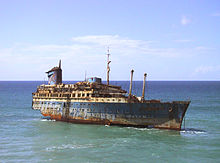Flotsam

Flotsam ( English flotsam ), all items that by ocean currents or tides from the sea in coastal , beach or shore to be rinsed.
General
Objects that can be used are all floating, sunken or propelled objects on the coast , but animals such as those found in whales are not. Another prerequisite is that the items must get to the beach or the coast; if they stay at sea, it is sea drift . Sea-like mineral oils or liquid tank loads are therefore not considered flotsam. Beach debris can only exist in coastal states .
species
These are mostly buoyant objects that can come from ships or crashed aircraft , mostly into the sea on another stretch of coast and then returned to the beach as flotsam :
- Flotsam in the narrower sense : the items recovered after a ship accident , from a ship in distress or from a crashed aircraft (for example shipping containers or other ship cargo );
- Throwing at sea : objects that are thrown overboard from a ship in distress in order to save the ship and / or the ship's crew and passengers (“major accident ”);
- Strandtrift (good for the beach ) : objects that have been driven towards the beach from the sea and recovered from the beach (such as messages in a bottle );
- Wreckage : sunken ship debris or other objects that have been washed up from the seabed.
Seetrift cannot become flotsam.
Legal issues
In Germany there had been a stranding order since January 1875 , which provided beach offices to which beach bailiffs were subordinate. They were responsible for the recovery or assistance and the acceptance of flotsam. All beach goods and sea litter that are driven by the water towards the coast and salvaged from the land were to be regarded as flotsam. In the GDR , a new basis was created with the "Ordinance on the Rescue of Lives and Vehicles from Distress at Sea and the Treatment of Beach Property" (stranding order of August 29, 1972).
By canceling the last time amended in July 1986 to Prussian Strandungsordnung on 30 June 1990 to classify the Strandguts took place in the beach right that the Fund law belongs. Flotsam is then ownerless , i.e. can be legally appropriated by the finder , if the previous owner has given up possession of the thing with the intention of renouncing ownership ( § 959 BGB ). In the case of flotsam, however, it can usually be assumed that the owner has not given up ownership, because flotsam is initially considered "lost on the high seas". The finder must therefore bring flotsam to a lost property office . If the owner reports, the finder is entitled to finder's fee ( § 971 BGB). If the owner does not contact us, the finder acquires property after six months ; however, the previous owner has a right to surrender the finder under enrichment law ( § 977 BGB).
International
Beach debris found on the shores of the UK or Canada must be reported to the Receiver of Wreck .
See also
Web links
Individual evidence
- ^ Verlag Technik, DDR-Seewirtschaft , Volume 5, 1973, p. 382
- ^ Collection of all printed matter of the German Reichstag, Negotiations of the Reichstag , Volume 1, 1874, p. 3 ff
- ^ Report wreck material . In: www.gov.uk .
- ↑ Receiver of Wreck FAQ . In: tc.gc.ca .

